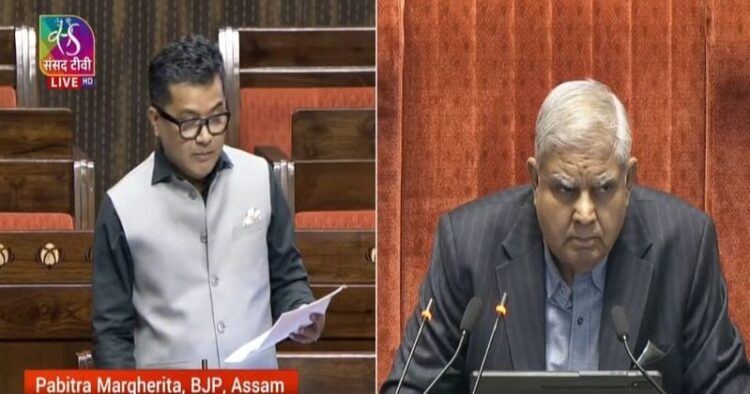In the rich tapestry of Indian cultural traditions, the act of consuming food transcends mere sustenance; it is considered a profound rite of passage. Rooted in ancient Bharat philosophy, the notion of ‘Brahma’ as the source of “absolute energy” or “absolute reality” underscores the significance of food as the sole energy source for the universe. Sanatan Dharma imparts teachings that view food as a sacred offering, making wasting it a violation of dharma, asserts Rajya Sabha MP from Assam, Pabitra Margherita.
During the zero hour of the upper house, MP Pabitra Margherita drew attention to the pressing issue of food waste in India, emphasising that in a society where religious values hold sway, excessive food wastage becomes a matter of serious concern. Citing the UNDP’s food waste index report, Margherita revealed that Indian households discard a staggering 6.87 crores tons of food annually, with an average wastage of 50 kg per person per year. India ranks second globally in household food waste, presenting a troubling scenario for a developing nation. The economic toll of this wastage amounts to approximately Rs 89,000 crore annually, nearly 1 per cent of India’s GDP, posing a significant challenge in a country where millions struggle to access sufficient food.
MP Margherita underscored that the repercussions extend beyond the squandering of food itself. The resources invested in its production and, more crucially, the hard work of farmers are also frittered away. While acknowledging a reported decline in food wastage, Margherita voiced concerns about the unpredictability and controllability of this trend. Addressing the individual nature of dietary choices, he advocated for behavioural and outcome changes through awareness programs, urging responsible behaviour among citizens.
In particular, Margherita highlighted the role of educational institutions in shaping responsible habits from a young age. He proposed integrating awareness programs at the school level, emphasising the importance of instilling ethical and environmentally conscious values in children. Aligning with Prime Minister Narendra Modi’s ‘LiFE’ (Lifestyle for Environment) campaign, Margherita emphasised the need for a concerted effort to minimise food wastage. He lauded the ‘Sankardev Shishu Niketon’ schools in Assam, run by Vidya Bharati, for imparting knowledge about the purity and value of food to lakhs of students, fostering a deep respect for food as the universal source of energy.
In a conversation with ‘Organiser,’ MP Margherita expressed his concern about the dichotomy between the Government’s efforts to ensure food safety for the underprivileged through schemes like PMASY and the alarming levels of food wastage in the country. He emphasised the importance of imparting early education about food purity and value, echoing the ethos of ‘Sankardev Shishu Niketon’ schools, to cultivate a mindset that minimises food wastage.
As India grapples with the economic and ethical challenges posed by excessive food waste, MP Pabitra Margherita’s call for a multi-faceted approach encompassing cultural sensitivity, behavioural change, and educational initiatives emerges as a timely and imperative solution. Only through collective efforts can the nation hope to forge a path towards a future where every morsel is valued, and food wastage becomes a relic of the past.




















Comments